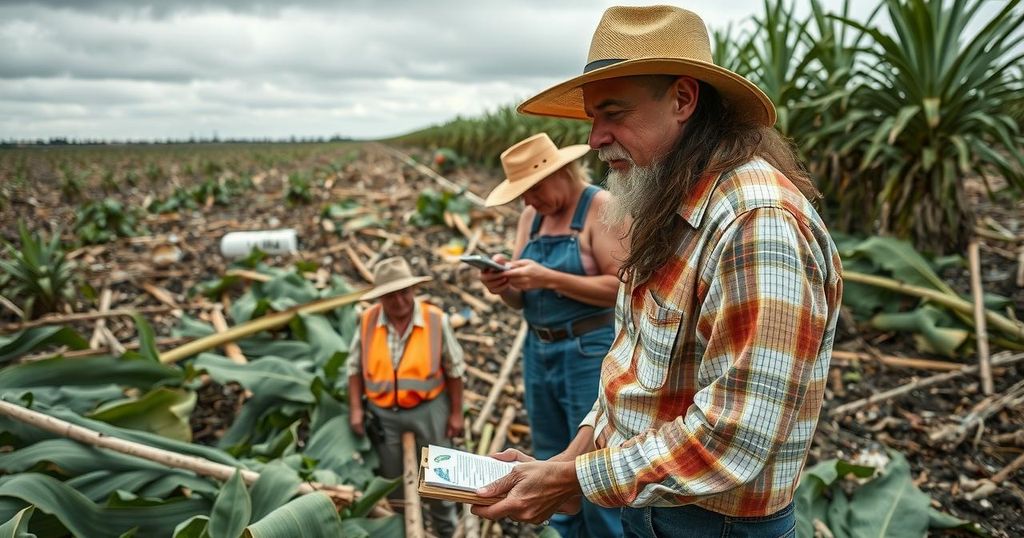Farmers Struggle with Hurricane Helene’s Aftermath in Georgia

Hurricane Helene wreaked havoc on farmers across Georgia, with damages exceeding $10 billion from ruined crops and destroyed infrastructure. Farmers, such as Chris Hopkins, face significant financial losses while grappling with emotional distress over their future in agriculture. State and federal assistance is being sought, yet hurdles remain as the agricultural community struggles to recover from the disaster’s extensive impact.
Farmers in Georgia continue to face severe challenges following the devastation caused by Hurricane Helene, which struck the region over two months ago. The storm’s aftermath is still apparent on many farms, including that of Chris Hopkins, whose property is littered with twisted equipment and downed trees. Helene swept through the South after making landfall in Florida on September 26 as a powerful Category 4 hurricane, resulting in widespread destruction of crops, including cotton, pecans, and vegetables, affecting the livelihoods of numerous farmers.
Livestock operations were also heavily impacted, with significant infrastructural damage reported. Agricultural experts estimate the overall financial impact will exceed $10 billion, with losses primarily attributed to ruined crops and damaged facilities. In Georgia, losses alone are estimated at over $5.5 billion, while other states such as North Carolina and Virginia have reported additional significant agricultural losses. Many farmers were in vulnerable stages of harvesting when the hurricane arrived, exacerbating their plight with immediate crop destruction.
Despite the difficulties, some farmers remain hesitant about their future in agriculture, wrestling with emotional and financial burdens. Insurance may help mitigate some losses, yet it often falls short of covering all damages. For instance, Chris Hopkins noted that despite having insurance, he anticipates a loss of $430,000 solely from his cotton crop, in addition to the costs associated with debris clearance and machinery repairs.
The state of Georgia has initiated emergency measures, redirecting funds to provide loans for farmers affected by the hurricane. However, legal restrictions prevent direct aid to individuals or private businesses, making recovery slow and complicated. In Congress, a proposal has emerged that includes disaster aid for farmers, indicating a recognition of the dire need for assistance in the agricultural sector.
The poultry industry has also suffered significant losses, with thousands of chickens lost and damaged facilities needing reconstruction. Industry representatives emphasize that affected farmers face an extended period of rebuilding, which will have far-reaching implications for production in Georgia. While consumer prices may not rise significantly due to crop shortages as alternative supplies fill the gaps, the situation in the pecan market could be more tenuous given Georgia’s substantial contribution to national production. As farmers attempt to recover, the combined impacts of natural disasters and economic pressures continue to weigh heavily on the agricultural community.
The article discusses the aftermath of Hurricane Helene, which struck the southeastern United States, particularly impacting Georgia’s agricultural sector. Farmers are still grappling with the consequences of the storm, which resulted in extensive damages to crops and infrastructure. Interviews with farmers illustrate the emotional toll of recovery efforts and the uncertainties regarding their future in agriculture. Additionally, the article highlights the financial burden imposed by the disaster, including estimates of total losses and governmental responses to assist affected individuals.
In summary, Hurricane Helene has unleashed significant devastation across Georgia’s agricultural landscape, resulting in billions of dollars in losses and leaving farmers to contend with emotional and financial hardships. While state and federal aid efforts are underway, the road to recovery remains uncertain. The impacts on production levels and market prices are expected to manifest in the coming months, underscoring the resilience required from those in the farming community as they navigate the aftermath of this catastrophic event.
Original Source: abcnews.go.com








